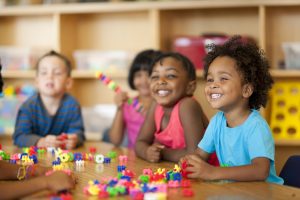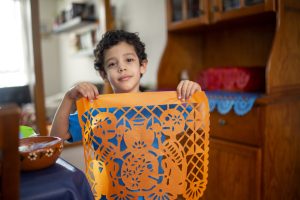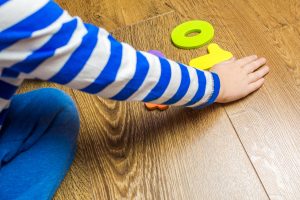From lullabies to cleanup songs to pop music earworms, we know that many families like to sing together. Not only is singing a pleasure, but it can also be used to help children learn math.
Singing songs with math content woven throughout the lyrics can support young children’s math development. As an example, children practice addition and subtraction while singing “Five Little Ducks,” a well-known song about a group of ducks decreasing in number every time they go out to play and, in the end, all coming back. Fingers represent the five ducks, folding down one finger every time a duck fails to return.
Noticing, talking about, and moving along with math in music grows children’s math skills and vocabulary. Focusing on math in songs can help children see math as enjoyable, which builds positive attitudes around math learning.
Songs that Inspire Math Thinking
To support families in learning math through music, we created math song guides based around six children’s songs:
- BINGO
- El Barquito Chiquitito
- Five Little Ducks
- Hokey Pokey
- The Wheels on the Bus
- Un Elefante se Balanceaba
Two of the resources are traditional Spanish children’s songs: “El Barquito Chiquitito” and “Un Elefante se Balanceaba.” In these guides, we offer both the Spanish lyrics and English translation.
We chose popular and well-known children’s songs that offer math content as well as flexibility to explore more math ideas. Most of all, we chose songs that are fun and catchy to sing!
The lyrics and accompanying movements in all these songs are easy to learn and adapt based on children’s interests or what is happening around them. For children who love vehicles, “The Wheels on the Bus” offers endless variety, since children can also sing about and discuss the wheels on the train or scooter or unicycle. “Un elefante se balanceaba,” which translates in English to, “an elephant was swinging,” could become a tune about your child’s favorite animal swinging on a spider web. Once your child knows the pattern in “BINGO,” sing a version spelling your child’s name.
Move, Groove, and Explore Math
Each song guide offers playful ways for caregivers to emphasize the math in the song. Everyone can use these guides to support children’s learning—no math or music background is needed.
- Song lyrics and a link to play video of the song.
- A summary of early math concepts embedded in the song.
- Ideas for caregivers to promote math while singing and playing with children.
- Instructions for an arts and crafts activity using common household materials.
The guides highlight key early math concepts in the songs, including numbers, counting, operations, data, measurement, shapes, and spatial thinking. In “The Hokey Pokey,” children think about geometry ideas like space and place as they move their bodies in a circle and put different body parts in and out of the center. “El Barquito Chiquitito” is about a tiny boat that dreams to sail for weeks on end. Through the song, children learn words about size relationships and the passage of time.
Tips for Using the Guides
Professionals who work with families with young children can use these guides in workshops, classrooms, or as part of story hour. The resources are designed so that professionals can go over the song with caregivers and children, point out the math in it, and build on the math concepts through song and dance. Ideas for arts and crafts activities connected to the songs provide another opportunity for children to explore math.
Caregivers can use the tips in the guides to develop their children’s math vocabulary and interests. They can sing and talk about math in the songs while doing everyday activities, like going to school or playing together. Families can play videos of the songs at home and sing along with the music. Then, use the ideas in these guides to look for math in other songs. You might be surprised by how many of your favorite songs include math.



